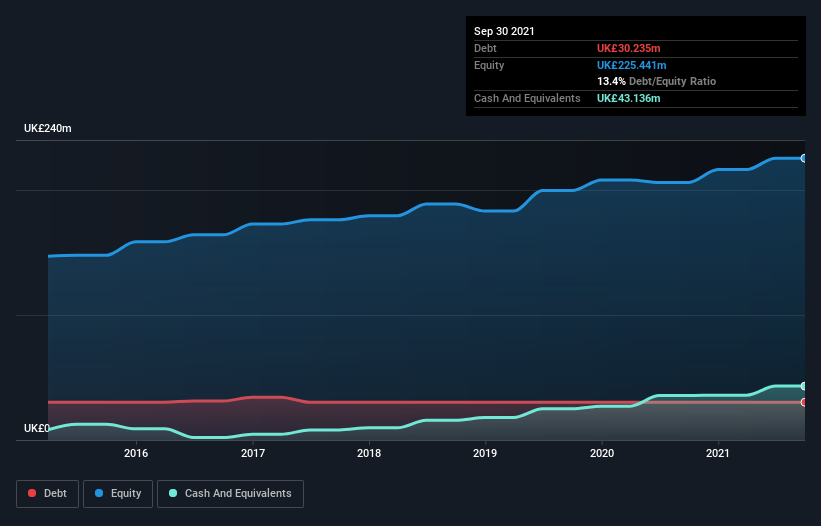These 4 Measures Indicate That Jersey Electricity (LON:JEL) Is Using Debt Reasonably Well
The external fund manager backed by Berkshire Hathaway's Charlie Munger, Li Lu, makes no bones about it when he says 'The biggest investment risk is not the volatility of prices, but whether you will suffer a permanent loss of capital.' When we think about how risky a company is, we always like to look at its use of debt, since debt overload can lead to ruin. We note that Jersey Electricity plc (LON:JEL) does have debt on its balance sheet. But should shareholders be worried about its use of debt?
When Is Debt Dangerous?
Debt assists a business until the business has trouble paying it off, either with new capital or with free cash flow. Part and parcel of capitalism is the process of 'creative destruction' where failed businesses are mercilessly liquidated by their bankers. While that is not too common, we often do see indebted companies permanently diluting shareholders because lenders force them to raise capital at a distressed price. Of course, the upside of debt is that it often represents cheap capital, especially when it replaces dilution in a company with the ability to reinvest at high rates of return. The first thing to do when considering how much debt a business uses is to look at its cash and debt together.
View our latest analysis for Jersey Electricity
What Is Jersey Electricity's Debt?
The chart below, which you can click on for greater detail, shows that Jersey Electricity had UK£30.2m in debt in September 2021; about the same as the year before. However, it does have UK£43.1m in cash offsetting this, leading to net cash of UK£12.9m.
A Look At Jersey Electricity's Liabilities
The latest balance sheet data shows that Jersey Electricity had liabilities of UK£22.7m due within a year, and liabilities of UK£87.5m falling due after that. On the other hand, it had cash of UK£43.1m and UK£18.0m worth of receivables due within a year. So its liabilities outweigh the sum of its cash and (near-term) receivables by UK£49.1m.
While this might seem like a lot, it is not so bad since Jersey Electricity has a market capitalization of UK£189.2m, and so it could probably strengthen its balance sheet by raising capital if it needed to. But we definitely want to keep our eyes open to indications that its debt is bringing too much risk. While it does have liabilities worth noting, Jersey Electricity also has more cash than debt, so we're pretty confident it can manage its debt safely.
But the other side of the story is that Jersey Electricity saw its EBIT decline by 7.9% over the last year. If earnings continue to decline at that rate the company may have increasing difficulty managing its debt load. When analysing debt levels, the balance sheet is the obvious place to start. But it is future earnings, more than anything, that will determine Jersey Electricity's ability to maintain a healthy balance sheet going forward. So if you're focused on the future you can check out this free report showing analyst profit forecasts.
But our final consideration is also important, because a company cannot pay debt with paper profits; it needs cold hard cash. Jersey Electricity may have net cash on the balance sheet, but it is still interesting to look at how well the business converts its earnings before interest and tax (EBIT) to free cash flow, because that will influence both its need for, and its capacity to manage debt. During the last three years, Jersey Electricity generated free cash flow amounting to a very robust 93% of its EBIT, more than we'd expect. That positions it well to pay down debt if desirable to do so.
Summing up
While Jersey Electricity does have more liabilities than liquid assets, it also has net cash of UK£12.9m. The cherry on top was that in converted 93% of that EBIT to free cash flow, bringing in UK£13m. So we are not troubled with Jersey Electricity's debt use. When analysing debt levels, the balance sheet is the obvious place to start. However, not all investment risk resides within the balance sheet - far from it. Case in point: We've spotted 2 warning signs for Jersey Electricity you should be aware of.
When all is said and done, sometimes its easier to focus on companies that don't even need debt. Readers can access a list of growth stocks with zero net debt 100% free, right now.
Have feedback on this article? Concerned about the content? Get in touch with us directly. Alternatively, email editorial-team (at) simplywallst.com.
This article by Simply Wall St is general in nature. We provide commentary based on historical data and analyst forecasts only using an unbiased methodology and our articles are not intended to be financial advice. It does not constitute a recommendation to buy or sell any stock, and does not take account of your objectives, or your financial situation. We aim to bring you long-term focused analysis driven by fundamental data. Note that our analysis may not factor in the latest price-sensitive company announcements or qualitative material. Simply Wall St has no position in any stocks mentioned.

